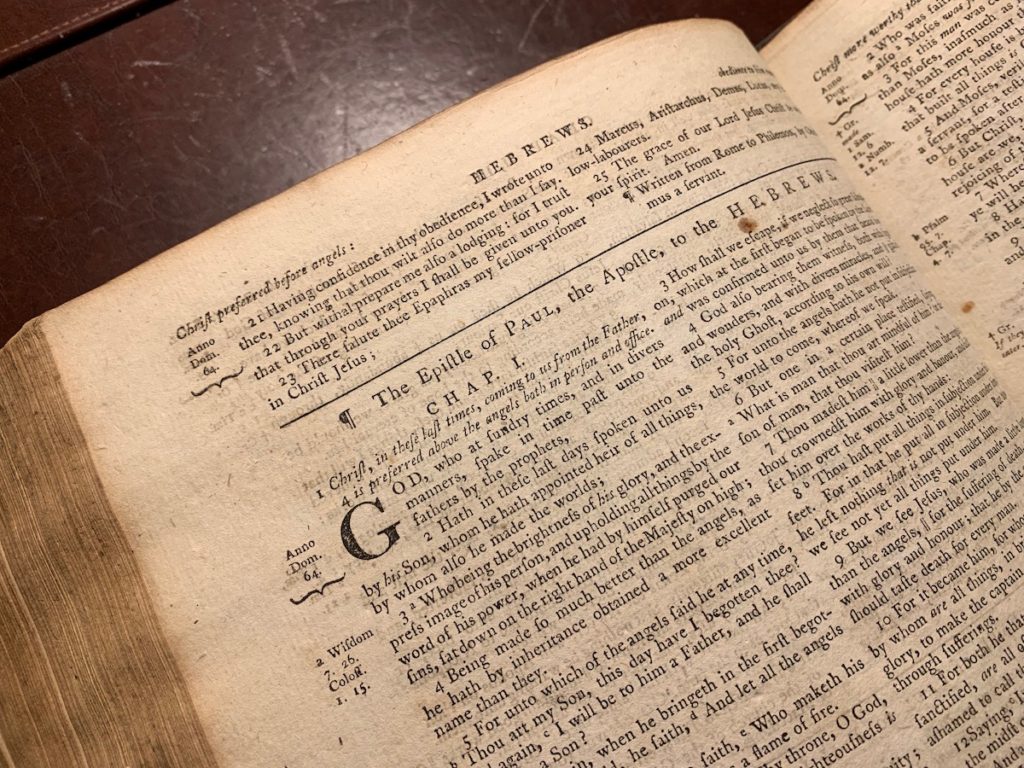
A debate exists among scholars as to when the Epistle to the Hebrews was written. Some believe it was written just before the destruction of the temple in Jerusalem in 70 AD, while others maintain that it was written just after 70 AD. This author favors the former position since the author of Hebrews speaks of the sacrificial system in the present tense as if it were still functioning (Heb 10:11; 13:10, 11).
At the same time, the author of Hebrews seems to be addressing the concerns of early believers that without the temple standing and the sacrificial system functioning, there is no longer remission for sins. He assiduously points out how the patterns and prophecies of the Tanakh are pointing to the greater priesthood of Messiah Yeshua in the heavenly tabernacle. As such, the author seems to have in view the destruction of the temple, yet while the temple is still standing. After all, Yeshua predicted the temple’s demise and that its destruction would be so complete that not one stone would be left standing on another (Matt 24:2; Luke 21:20–21).
Perhaps, the author was writing Hebrews in the four-year time period (between A.D. 67 to A.D. 70) when the Romans besieged Jerusalem, then pulled away for one year, then rebesieged and finally destroyed the city in A.D. 70. The events of A.D. 67 to 69 may have caused the writer to feel that Jerusalem’s fall was imminent in fulfillment of Yeshua’s earlier prophecies.
Main Themes
In his Epistle to the Hebrews, the author emphatically asserts that:
- Yeshua is over all.
- Yeshua is leading his people to the ultimate higher spiritual reality.
- The Tanakh (Old Testament) validates the gospel message.
- The Epistle to the Hebrews is about transformation, shifting, growing from a lower level to a higher level spiritually. It is about one coming closer to the reality of heaven in their spiritual walk; about one approaching and growing closer to Elohim.
- Though Hebrews doesn’t deal directly with this issue, we have to ask the following question: While in this flesh on the earth, do we abandon the letter of the Torah-law’s types and shadows and live in a spiritual dimension only? We know from Hebrews that through Yeshua’s death and resurrection, we have moved from the higher spiritual level with regard to the tabernacle system, and the Levitical priesthood and sacrificial systems. But does this apply to the rest of the Torah as well (e.g. the Sabbath, feasts, dietary laws, etc.)? Christianity by in large teaches that it does. But this is not what the writer of Hebrews is saying. The transformation of the priesthood and sacrificial systems to the higher level of reality in Yeshua doesn’t invalidate the rest of the Torah. Believers are still required to keep the rest of the letter of the Torah law as best they can. As physical beings living in this earthly dimension, we still have to follow the Torah-Word of Elohim as it applies to our physical walk (e.g. don’t murder, steal, commit adultery, lie, worship idols, etc.). But at the same time, we are to walk, as much as possible, in the heavenly dimension by following spirit of the Torah, being led of the Spirit in our walk and by focusing our attention on Yeshua, our heavenly High Priest. As such, redeemed believers are caught having to walk between the physical and the spiritual dimensions. We are in the process of being transformed from the physical to spiritual. Until this total transformation takes place, we must meld the physical or letter of the law and the spiritual realms, and we must keep progressing toward the ultimate goal of the higher Torah, which is total spiritual existence and oneness as Elohim’s children in his eternal kingdom as characterized by the New Jerusalem.
Outline of Hebrews
Overview: Yeshua is priest, prophet and king
In the Tanakh, the priest, prophet and king were the three principal leaders in ancient Israel. No one except Moses was all three. David was a king and prophet, but not a priest. Samuel was a priest and a prophet, but not a king. Scripture tells that Moses was all three. Yeshua was the only other Person who was all three. Deuteronomy 18 tells us that Moses was a prophetic shadow picture of a greater Moses who would come. The writer of Hebrews validates this and shows that Yeshua was that greater Moses.
Hebrews 11:1 explains this process by defining faith. We live in the physical world, but we hope through faith for the spiritual world to come. Our spiritual forefathers went through this process successfully, though they paid a great price physically, anticipating in faith their heavenly reward. This is the story of Hebrews 11—the faith chapter.
Yeshua is the vehicle that leads us onward and upwards to the higher spiritual dimension. He is the ladder to and gate or door of heaven. He proclaims this in John 1:51 and John 10:7. Jacob dreamed of this ladder or highway to heaven, which was a picture of the Written and Living Torah (literally, a Torah scroll). (See telios: Col 1:28; Eph 4:13; Phil 3:13)
Hebrews and other places in the Testimony of Yeshua (NT) talk about coming to this higher goal (e.g. Matt 5:17; Rom 10:4; Heb 9:9, 11; 10:14; Heb 6:1; Heb 7:19; 9:9; 10:1, 14; 12:23).
The Tanakh prophesies that the Messiah to come would be a priest, prophet and king.
- Priest: Ps 110:4; Mal 3:1–3; Isa 53:12
- Prophet: Deut 18:15–19
- King: Ps 2:1–12; Isa 9:6–7; Ezek 37:24–27
It is important to note that Hebrews focuses on Yeshua’s role as that greater heavenly high priest that the Tanakh prophesied would come.
The Superiority of Messiah Yeshua Over OT Personages (1:1–4:13)
- Yeshua as Creator, Sovereign and Sustainer of the universe is superior to all things including the prophets — 1:1–3 (Ps 110:1)
- Yeshua is superior to the angels —1:4–2:18 (Ps 97:7)
- Yeshua is superior Moses —3:1–19 (Deut 18:15–19)
- Yeshua is superior to Joshua — 4:1–13
The Superiority of Messiah Yeshua’s Priesthood Over OT Priesthood (4:4–5:10)
- Yeshua is superior to Aaron — 4:14–5:10 (Ps 110:4; Mal 3:1–3; Isa 53:12 —Yeshua, the Suffering Servant, to take the role of high priest as an intercessor for transgressors before Elohim)
- Yeshua’s priesthood is after the order of Melchizedek — 7:1–8:5 (Ps 110:4)
Yeshua Mediator of a Better Covenant Than the First Covenant (8:6–10:18)
- The Renewed Covenant: a better covenant — 8:6–13 (Jer 31:31–33)
- The First Covenant’s sanctuary and sacrifices — 9:1–10
- Compared with the Renewed Covenant — 9:11–10:18





